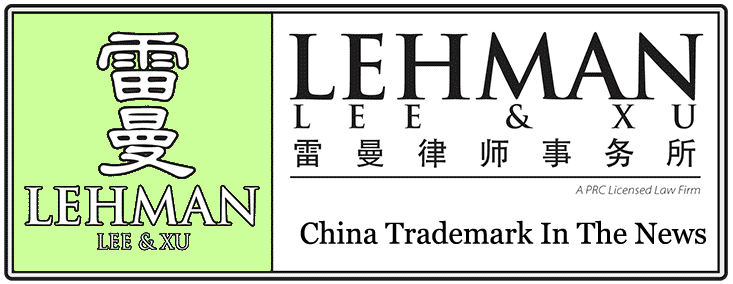
 |
|
LEHMAN, LEE & XU
|
|
China Trademark In The News
|
|
September 2011
|
In the News |
China Trademark Law amendment for public comment |
Xinhua Beijing, September 2 (Reporter Chen Fei) To strengthen the administration of trademarks, China¡¯s State Council Legislative Affairs Office on the 2nd draft published a draft revised Trademark Law, to seek public views of the community. |
Court rules iPad news app illegal, levies fine |
| China daily Updated: 2011-08-31 BEIJING - Haidian District People's Court recently ruled that an iPad application for Chinese-language news violates copyrights, levied a 100,000-yuan ($15,600) fine and ordered the developer to withdraw the software. The lawsuit filed by Beijing News alleged Minesage Co Ltd illegally used its content and layouts in software that was developed for the iPad. The newspaper discovered the app called Chinese Newspapers last year before it developed its own software for the iPad. "We sent documents to the company asking them to stop the violation, but got no response," said a spokesman for Beijing News. "As a result, to protect our intellectual property rights and profits, we made the decision to bring legal action against the software developer." Minesage argued in court that it showed readers the content copyright belonged to the original media. In addition, the company said it only provided links to the news, so it did not harm the newspaper's interests and might actually bring in customers. But the judge found no description of link services or news sources in the software support documentation. The company also admitted the software allowed customers to download e-papers without visiting a newspaper's website, which the court found to be illegal. Zhang Fan, an expert at Chinese IT industry research firm Analysys International, said the court ruling is not surprising. "It is clear that the company violated the newspaper's Internet transmission rights because it neither received authorization nor paid the copyright owner," Zhang said. He noted that the rising popularity of the iPad and iPhone across the nation has led to an increasing number of traditional publishers to develop e-paper editions, bringing new challenges to copyright protection. "Compared with traditional Internet applications, the new mode brought by best-selling tablet computers and smartphones could make infringing actions more concealed," he explained. "It is progress that they innovate forms of traditional media, but software developers should not forget to show respect to copyright owners and create within the legal framework," said Zhang. Yuan Fuzhen, deputy director of the Shanghai Intellectual Property Research Institute, noted that traditional media could learn from the case. He also suggested that lawmakers increase compensation in copyright violations. "The compensation is not very much, which creates an imbalance between the cost of defending one's rights and the illegal income to the infringer," Yuan said. |
China Law News |
CONTENTS
_______________________________________________________________________
Singapore Gains as Hong Kong Follows China Rule on ImmunityOn Aug. 26, China approved an interpretation of Hong Kong's Basic Law that states the city should follow central government policy giving countries absolute immunity. Rule stiffens penalties for hackersBEIJING - Hackers who broke into 20 or more computers will face jail terms of up to seven years, according to a new judicial interpretation issued jointly by the China's Supreme People's Court and Supreme People's Procuratorate. People who hack from 20 to 100 computers, or steal from 10 to 50 user names and passwords for online-payment or stock accounts, will get at least three years in prison. And those who hack even more computers or steal more passwords will face jail terms of up to seven years. The latest rule, an interpretation made to deal with online crimes, which were added to the Criminal Law in 2009, also applies to Chinese hackers who steal information from foreign computers, said Zhou Guangquan, a member of the National People's Congress's law committee and a professor in criminal law at Tsinghua University. Continue reading at: http://usa.chinadaily.com.cn/china/2011-08/30/content_13216410.htm China's 12th Five-Year Plan Lays Out Ambitious Blueprint, But Data Challenges RemainIn March, China released its 12th Five-Year Plan? a blueprint outlining the key economic and development targets for the country over the next few years. Unlike previous Plans, climate change and energy are featured prominently, and a strong emphasis is placed on a slower, more sustainable growth trajectory. Not only is the 12th Five-Year Plan the first to mention climate change, but it adopts as part of national, binding law the climate pledges China first made at the United Nations Framework Convention on Climate Change (UNFCCCC) Copenhagen climate summit in December 2009. Binding targets for a range of other environment and energy issues are also included in the Plan, including important air and water quality pollutants that were previously absent. Part of the country's ability to achieve these targets will be in its capacity to measure and track progress toward its goals. The Chinese government has pledged implementation of ¡°well-equipped and statistical and monitoring systems¡± and ¡°index evaluation systems¡± in the 12th Five Year Plan, indicating an increasing awareness of the importance of data, information and robust infrastructure to ensure targets are met. However, while there are signs of China's move toward a more ¡°data-driven¡± approach to decision-making in the formulation of the latest Plan, political sensitivities around pollution information still persist, meaning China may still confront challenges when trying to improve environmental conditions. Continue reading at: http://environment.yale.edu/envirocenter/post
|
|
|
|
|